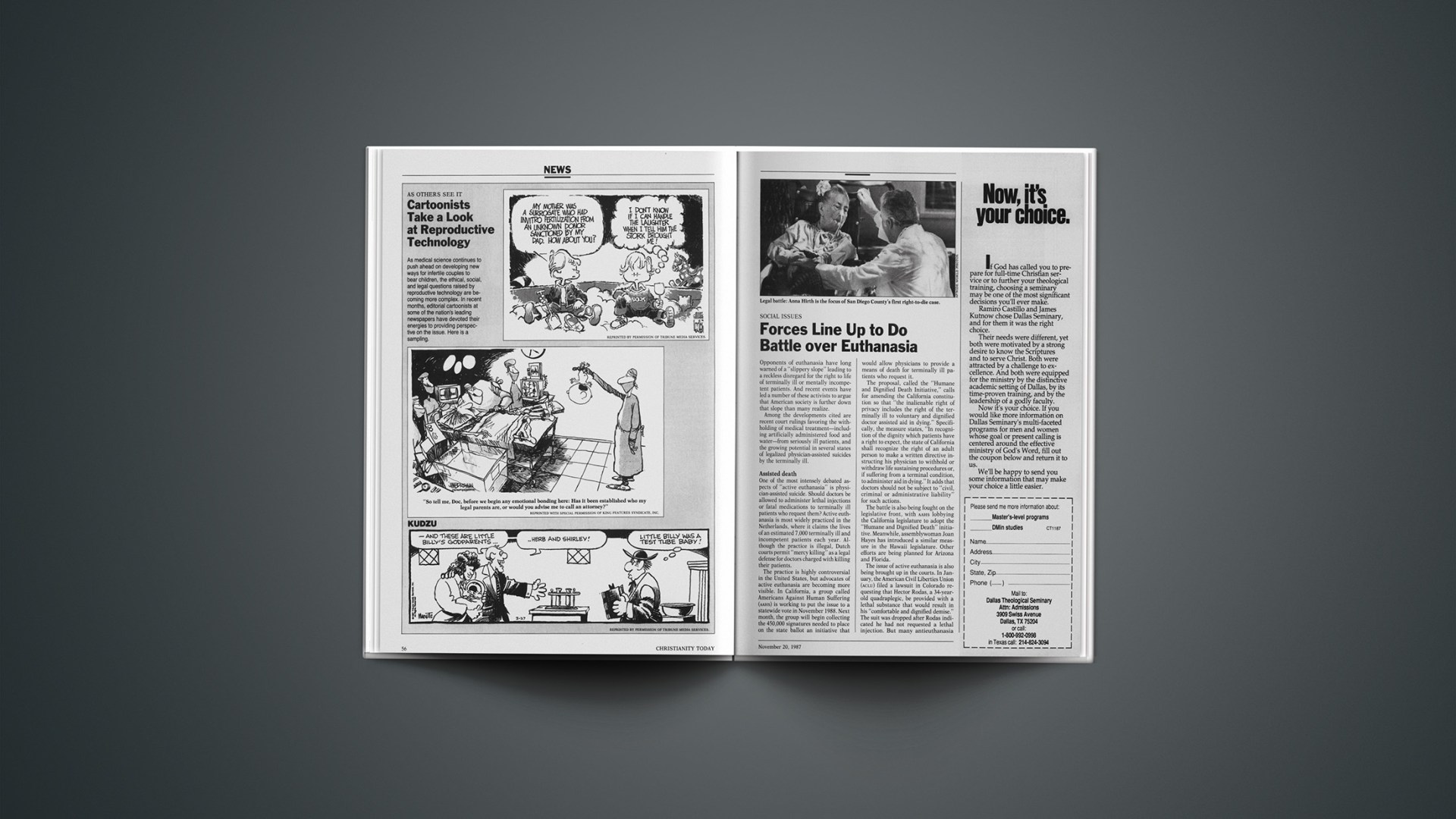Opponents of euthanasia have long warned of a “slippery slope” leading to a reckless disregard for the right to life of terminally ill or mentally incompetent patients. And recent events have led a number of these activists to argue that American society is further down that slope than many realize.
Among the developments cited are recent court rulings favoring the withholding of medical treatment—including artificially administered food and water—from seriously ill patients, and the growing potential in several states of legalized physician-assisted suicides by the terminally ill.
Assisted Death
One of the most intensely debated aspects of “active euthanasia” is physician-assisted suicide. Should doctors be allowed to administer lethal injections or fatal medications to terminally ill patients who request them? Active euthanasia is most widely practiced in the Netherlands, where it claims the lives of an estimated 7,000 terminally ill and incompetent patients each year. Although the practice is illegal, Dutch courts permit “mercy killing” as a legal defense for doctors charged with killing their patients.
The practice is highly controversial in the United States, but advocates of active euthanasia are becoming more visible. In California, a group called Americans Against Human Suffering (AAHS) is working to put the issue to a statewide vote in November 1988. Next month, the group will begin collecting the 450,000 signatures needed to place on the state ballot an initiative that would allow physicians to provide a means of death for terminally ill patients who request it.
The proposal, called the “Humane and Dignified Death Initiative,” calls for amending the California constitution so that “the inalienable right of privacy includes the right of the terminally ill to voluntary and dignified doctor assisted aid in dying.” Specifically, the measure states, “In recognition of the dignity which patients have a right to expect, the state of California shall recognize the right of an adult person to make a written directive instructing his physician to withhold or withdraw life sustaining procedures or, if suffering from a terminal condition, to administer aid in dying.” It adds that doctors should not be subject to “civil, criminal or administrative liability” for such actions.
The battle is also being fought on the legislative front, with AAHS lobbying the California legislature to adopt the “Humane and Dignified Death” initiative. Meanwhile, assemblywoman Joan Hayes has introduced a similar measure in the Hawaii legislature. Other efforts are being planned for Arizona and Florida.
The issue of active euthanasia is also being brought up in the courts. In January, the American Civil Liberties Union (ACLU) filed a lawsuit in Colorado requesting that Hector Rodas, a 34-year-old quadraplegic, be provided with a lethal substance that would result in his “comfortable and dignified demise.” The suit was dropped after Rodas indicated he had not requested a lethal injection. But many antieuthanasia groups saw this as the beginning of a series of attempts to get the courts to sanction active euthanasia. “That the ACLU, self-proclaimed defenders of the downtrodden, have made it a quest to help the most defenseless of their clients be killed, is deplorable,” said Mary Senander of the International Anti-Euthanasia Task Force.
Withholding Treatment
While the courts have not yet ruled on the issue of lethal injections, they have been favorable to the withholding of medical treatment. In the landmark 1976 case of Karen Ann Quinlan, the New Jersey Supreme Court granted the family’s request that Quinlan, who was comatose, be disconnected from her respirator. After being taken off the respirator, Quinlan lived until 1985.
Earlier this year, the New Jersey Supreme Court took that decision a step further when it granted a family’s request that the feeding tube be removed from Nancy Ellen Jobes, a 32-year-old woman who was brain damaged as the result of an accident. The court also ruled that the nursing home where Jobes had lived for seven years could be forced to remove the tube, despite the institution’s objections. Jobes was moved to a hospital that did not object to the withholding of food and water, and she died in August.
Similar cases have come up, largely since the American Medical Association took the position last year that “nutrition and hydration” be included in the list of life-prolonging medical treatments that may be discontinued “even if death is not imminent.” Senander, of the International Anti-Euthanasia Task Force, said she believes the “debate on the withholding of food and fluids is ‘greasing the skids’ for lethal injections.”
In response to what they see as a growing threat, anti-euthanasia leaders are vowing to develop a more organized opposition to euthanasia efforts. At a conference last month in Ohio, leaders from 19 states and the District of Columbia signed a “Declaration in Opposition to Euthanasia.” The document states, “We categorically reject euthanasia in American society as it masquerades under the euphemisms of ‘a right to die,’ ‘aid in dying,’ and ‘death with dignity’.… Human beings, young and old, healthy and debilitated, have an inalienable right to food and water, warmth, and competent, compassionate care, and the law and learned professions must recognize and reflect this.” The signers also agreed to begin a “major educational effort” against the California Humane and Dignified Death Initiative, which they said “would impact on the entire nation.”










